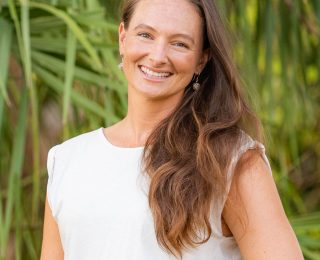LAUREN BELL 2020 RURAL WOMEN’S AWARD FINALIST
OVER 100 RRR WOMEN IN WA IN THE PAST 20 YEARS HAVE SUBMITTED APPLICATIONS TO THE RURAL WOMEN’S AWARDS (RWA). THERE HAS BEEN MORE THAN 60 PROJECT IDEAS THAT HAVE EITHER GONE ON TO WIN THE RWA FOR THAT YEAR OR HAVE BEEN FINALISTS AND PROGRESSED IN SOME WAY. EACH PROJECT HAS HAD A JOURNEY AND SUCH STORIES OUGHT TO BE SHARED. THIS IS BECAUSE THEY ARE MOTIVATING, AND THEY ENCAPSULATE THE PASSION, INNOVATION AND TALENT THAT RESIDES IN OUR RURAL REGIONAL AND REMOTE PARTS OF WA.
Lauren founded ‘Waste Not Food Recycling’ to develop a system of organic waste management that builds the economies of regional and remote communities in Northern Australia, not landfills. Sending organic waste to landfill is highly problematic, as it generates greenhouse gases, produces liquid leachate that can pollute groundwater, creates odour, attracts pest animals and creates unstable landforms. It is also an incredible waste of resources.
However, a significant challenge to viable organic waste management systems, especially in remote and regional areas, is the financial value of the end-product and the proximity to suitable markets. A lack of profitable systems, especially in areas outside of waste levy zones, is a deterrent to redirecting organic waste away from landfill.
Black Soldier Fly (BSF) farming offers a solution to these challenges, as it is capable of upcycling organic waste into high-value feed and fertilizer products that can be marketed to a range of regional industries, particularly aquaculture and horticulture. The financial profitability incentivises communities to adopt the system, and the locally available feed and fertilizer outputs assist with reducing the cost of key inputs and supply chain insecurities for those industries. It is system that builds resilient circular economies, not landfills.
The BSF is a naturalised, non-pest species. The adult fly has no mouthpiece and doesn’t bite, sting or transmit disease. To sustain themselves through metamorphosis and adult life, the larvae are voracious feeders, consuming twice their body mass on a daily basis. BSF farming involves feeding organic waste to the larvae, and then harvesting the larvae when at their nutritional peak. On average the larvae are 40% protein and 30% fats. They can be processed into protein meal and bio-oil which can be utilised as feed ingredients. The residual organic waste and larval faeces can be further processed via composting, bio-digesting or vermiculture into an organic soil improver and other by-products.
The value of BSF farming over other traditional organic waste systems, such as composting, is in its production of feed protein. To be able to meet the challenge of sustainably feeding 9 billion people by 2050 requires the utilisation of sustainable innovative food and feed sources. BSF larvae protein for animal feed can reduce dependence on fish-meal and soy-protein. Larvae protein is cost stable, not climatic dependent, and highly efficient. BSF larvae have a higher feed – protein conversion ratio and lower water footprint compared to conventional protein sources. In 1 acre in 1 year it is possible to produce over 60,000kg of BSF larvae protein versus 779kg of poultry, 435kg of soy, 166kg of pork and 19kg of beef.
There is a ready demand for locally available feed protein in Northern Australia. It has been identified that one of the major barriers to the growth of aquaculture in Northern Australia is the high-cost of key inputs, such as feed, that are exacerbated by freight costs. Whilst aquaculture is Australia’s fastest growing primary industry, there is also growing industry and consumer concern that aquaculture doesn’t take pressure off wild fisheries. This is as many carnivorous and omnivorous aquaculture species are dependent on fishmeal and fish-oil (FMFO) that is sourced from wild fish-stock. These wild-stocks are already fished at their maximum sustainable limit. Therefore, alternative aquaculture feed ingredients need to be found, and larval protein and bio-oil can be a suitable full or partial replacement of FMFO.
Lauren’s ambition is that, if she can establish a model of BSF farming for organic waste management that is financially viable in Broome, then that model can be implemented in other regional towns in the Kimberley, Pilbara, Gascoyne and even extended to the NT and Northern QLD.
Lauren has already established a pilot project that the climate of Northern Australia is suited to BSF farming. Now the focus is on identifying the most suitable aquaculture markets. Lauren is working on sourcing funding to upscale her pilot operations to produce product to test for suitability for inclusion in the diets of both niche and established aquaculture species farmed in Northern Australia. This includes; fresh-water crustaceans, crocodiles, barramundi and marine prawns.
Despite growing up and going to University in Sydney, her focus is on Northern Australia as she has spent nearly the last decade living and working across the north. From the Gulf of Carpentaria in QLD, to the NT and now a proud Kimberley resident. The majority of this time was spend working on remote cattle stations. This journey across the Top End, especially her station experience, has instilled in her some core values. It’s a respect for Australia’s highly regarded clean and green Agriculture industry, a desire to partake in the challenge of feeding a growing global population, and a love for our unique environment. It was to these values that the concept of BSF farming immediately appealed to. Lauren does not want regional communities to miss out on partaking in and gaining economic and environmental value from this innovative new industry.
Lauren hopes that this journey from Sydney-sider, to station-hand, to fly-farmer helps demonstrate to others that inexperience is no barrier to a rural experience. That you do not need to come from a farming family to pursue a career in agriculture or a life outside the cites.
Likewise, Lauren hopes to demonstrate that there are a diversity of industries and roles open to women in agriculture and countless opportunities for them to contribute to the future of farming in Australia.

